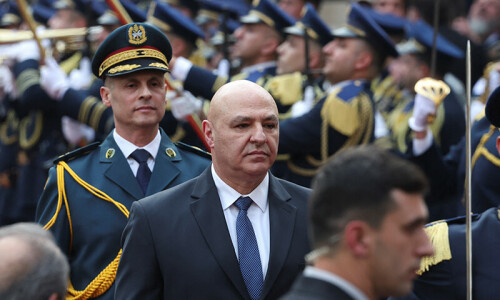BEIRUT: Lebanese President Joseph Aoun on Monday picked international jurist Nawaf Salam to form a government for the war-scarred country and pull it out of economic crisis.
A majority of Lebanese lawmakers endorsed Nawaf Salam, the presiding judge at the International Court of Justice in The Hague, after two years of caretaker government.
“The president of the republic called on Judge Nawaf Salam to task him with forming a government, knowing that he is currently abroad. It has been decided he will return tomorrow,” the presidency said.
Aoun, whose election last week ended a two-year vacancy for the post, held consultations with lawmakers ahead of announcing his nominee. By Monday afternoon, 84 members of parliament told Aoun they backed Salam, according to a tally by Lebanese media, with nine endorsing Najib Mikati who has served as prime minister in a caretaker capacity.
Hezbollah terms the move ‘complete US coup’
Aoun’s election last week was made possible in part by the weakening of Hezbollah in a war with Israel. With the prime minister named by the president, the eastern Mediterranean country has been run by a caretaker government for more than two years amid a crushing economic crisis.
Under Lebanon’s power-sharing system, the president must be a Maronite Christian, the prime minister a Sunni, and the parliament speaker a Shia.
‘Change’
Salam’s backers view the judge and former ambassador as an impartial figure able to carry out much-needed reforms, a contrast to Mikati regarded by critics as under Hezbollah’s influence.
Lawmaker George Adwan of Christian party the Lebanese Forces said after meeting Aoun and endorsing Salam that it was time for Hezbollah to focus on “political work”. “The era of weapons is over,” Adwan told reporters.
Hezbollah ended a deadly war against Israel this autumn bruised and weakened.
Under a ceasefire deal, the group must pull its fighters from areas of southern Lebanon near the Israeli border as the national army — until last week under Aoun’s command — and UN peacekeepers deploy there.
Hezbollah also lost a key ally in neighbouring Syria when religious-led forces toppled president Bashar al-Assad last month. Independent lawmaker Melhem Khalaf said he backed Salam as a candidate of change.
A source close to Hezbollah said that the movement and its ally Amal movement supported Mikati. The Monday front page of Al-Akhbar, a newspaper close to Hezbollah, said Salam’s nomination would be tantamount to a “complete US coup”, after Washington had backed Aoun for president.
‘Two options’
In his inaugural speech on Thursday, Aoun said his election as president would usher in a “new phase” for the country. Lebanese university professor Ali Mrad said support for Salam’s nomination reflected “the real changes that Lebanon is experiencing”.
“Today there are two options in the country: a serious reform option, called Nawaf Salam, and an option that takes us back, called Najib Mikati,” he said.
Some opposition lawmakers on Saturday threw their weight behind anti-Hezbollah lawmaker and businessman Fouad Makhzoumi, but on Monday he withdrew to allow consensus around Salam. Whoever heads Lebanon’s new government will face major challenges, including implementing reforms to satisfy international donors amid the country’s worst economic crisis in its history.
They will also face the daunting task of reconstructing swathes of the country after the Israel-Hezbollah war and implementing the Nov 27 ceasefire agreement.
Published in Dawn, January 14th, 2025













































